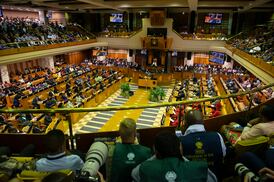As the world’s gaze turns to Johannesburg and Tshwane for the G20 Leaders’ Summit in November, the urgency of translating the Urban 20’s (U20) priority of “Digital Transformation and Innovation” into practical action for African cities, has never been greater.
At the heart of this initiative’s transformative agenda is a pivotal question: are African municipalities financially ready for the digital revolution that smart cities demand?
Africa is urbanising at an unprecedented pace. By 2050, 75% of the global population will reside in cities, up from 50% in 2024. Six of the world’s 41 megacities will be located in Africa by 2030, absorbing substantial national populations and linking the continent to the global economy. Yet the infrastructure to sustain this growth is severely lagging.
Municipalities across the continent are under pressure to expand services, improve public transport and deliver on the growing digital expectations of citizens, all while operating with limited fiscal space, outdated systems, and insufficient human capital.
Smart cities, bold promises — but at what cost?
Smart cities offer a compelling promise: harnessing data, technology and innovation to deliver efficient, inclusive and sustainable urban services. From AI-driven dashboards to real-time transport tracking and internet of things-enabled (IoT) waste management, African cities like Kigali, Nairobi and Cape Town are piloting initiatives that signal what’s possible. But scaling such efforts requires more than technological ambition — it demands sound municipal finance, institutional readiness and inclusive governance frameworks.
The fiscal challenge is particularly stark. Most African municipalities lack the autonomy, tools and revenue streams to finance large-scale smart infrastructure. Property taxes, the backbone of municipal revenue, remain underutilised due to outdated valuations, insufficient technical capacity, and weak enforcement systems.
While financing tools like land value capture, green bonds and municipal borrowing are promising, they remain out of reach for many cities that are constrained by low creditworthiness, limited financial reporting and poor financial governance.
Moreover, many cities still rely on paper-based billing systems and fragmented data infrastructures, thereby limiting their ability to plan effectively or deliver services efficiently. Without investment in digital infrastructure and business intelligence systems, smart city ambitions will remain just that — ambitions. A smart city cannot be built on analogue foundations.
Leapfrogging limits, fiscal fixes and institutional reforms
Amid these challenges, the digital revolution presents African municipalities with a unique opportunity to leapfrog traditional development barriers. Encouragingly, early successes are emerging across the continent.
Dakar’s Bus Rapid Transit system, for example, is designed to move more than 300,000 passengers daily using smart ticketing and integrated data systems. Kigali’s deployment of a low-power, wide-area network enables real-time data collection from IoT sensors, offering insights for smarter urban management.
These cases are proof that even in resource-constrained settings, with the right partnerships, political will and financing models, African cities can deliver. But levels of readiness vary significantly across the continent, and this is where South Africa’s G20 presidency must play a catalytic role. The U20’s call to recognise cities as strategic partners in national development must be translated into tangible support through greater fiscal decentralisation, capacity-building and smarter infrastructure financing.
To sustain and scale smart city initiatives, African municipalities need enhanced financial resilience. This means modernising property tax systems using a geographic information system (GIS), expanding digital financial tools, and strengthening municipal credit-worthiness to access capital markets. Integrated financial management systems can improve transparency and co-ordination across departments.
Meanwhile, blended financing models, combining grants, green bonds and public-private partnerships offer practical avenues to bridge funding gaps. National governments and development finance institutions must work collaboratively to support these reforms and co-develop readiness assessment tools that are tailored to local contexts.
Smart cities need smart people
Investing in human capital is equally important. The intelligence of a smart city lies not in sensors or software, but in the people who design, manage and use them. Yet across the continent, digital literacy remains low, especially among marginalised communities and women, who are 37% less likely to use mobile internet than men.
About 470-million people in Sub-Saharan Africa lack proof of identity, a key barrier to digital access. Municipalities must invest in digital upskilling for staff and communities alike, while planning for workforce transitions as automation reshapes local government roles.
Bridging the digital divide
Critics may argue that focusing on digital innovation in cities, while many citizens still lack access to water, electricity or safe transport, is misplaced. But this is a false dichotomy. Smart technologies, when designed for inclusion, can improve access to these very services by increasing efficiency, targeting subsidies and improving responsiveness.
The question is not whether African cities can afford to embrace the digital revolution — — but whether they can afford not to.
A smart agenda for action
What’s needed now is action. To move from promise to practice, cities must:
- Conduct baseline smart city readiness assessments using standardised tools, thereby enabling local governments to evaluate their capacity across three key areas: institutional arrangements, existing infrastructure and human capital;
- Upgrade core infrastructure with IoT integration;
- Modernise property tax systems through GIS to expand the tax base and boost revenue collection;
- iImprove financial management and reporting to strengthen creditworthiness;
- Embrace green bonds and public-private partnerships as viable financing tools; and
- Build multi-stakeholder coalitions that include national government, development partners, development banks and citizens to bridge funding gaps and improve financial preparedness for smart city infrastructure projects.
In the spirit of South Africa’s G20 presidency, let us ensure that digital transformation is not a privilege for a few cities, but a shared pathway to inclusive, prosperous and resilient urban futures. Municipalities must not be side-lined, but positioned at the heart of innovation. After all, if smart cities are the future, Africa must help define them.
• Monkam is associate professor of public economics, head of the Public Policy Hub and chair in municipal finance at the African Tax Institute at the University of Pretoria




Would you like to comment on this article?
Sign up (it's quick and free) or sign in now.
Please read our Comment Policy before commenting.